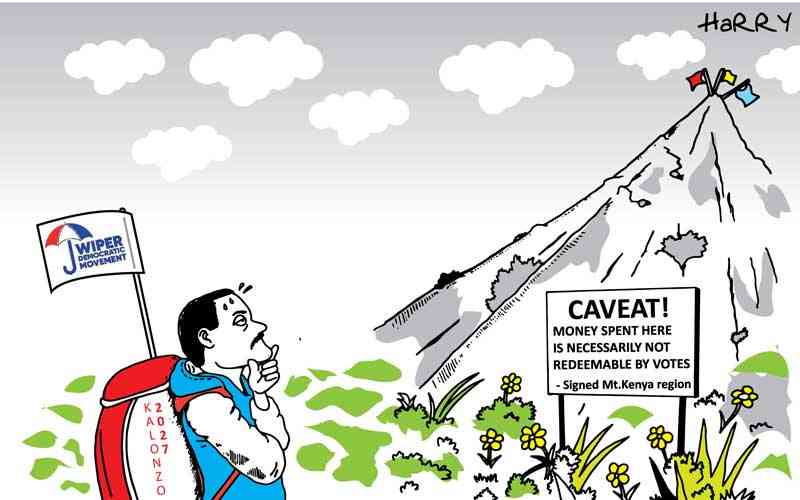On May 11, the World Health Organisation released a statement reiterating that tobacco kills more than eight million people every year.
Of these, more than seven million die from direct tobacco use while 1.2 million are non-smokers who die from exposure to second-hand smoke.
For me and thousands of other Kenyans, this data reminds us of people we know who lost their lives either because of smoking or consistent exposure to tobacco smoke. That’s why I was quite happy when on August 9, 2007 and after five years of debate, Parliament passed the Tobacco Control Bill that later became the Tobacco Control Act 2007.
This Act effectively delegitimised smoking in public places and in so doing, saved thousands of lives. It’s interesting that this historic Act was passed when Kenya was right in the middle of heated campaigns for the 2007 elections.
The fact that MPs from opposing parties came together to pass this Bill exemplified the power of good politics. This lent credence to Kenya’s second President Daniel Arap Moi’s famous words that, ‘siasa mbaya, maisha mbaya,’. The opposite of this is true because good politics results in a good life.
Although Kenya is still more than two years away from the next elections and right in the middle of a pandemic, politics has sneaked back to the centre stage.
Instead of demanding a cessation of politics, we should demand for good politics. Kenyans don’t have to choose between politics and development because that is a false choice. But they can choose between good politics and bad politics.
Bad politics is rooted in ignorance. As George Bernard Shaw, the Irish political activist once said, “He knows nothing and thinks he knows everything. That points clearly to a political career”. Politicians with a know-it-all attitude are in fact, ignorant and thus messengers of bad politics that destroys lives.
The big question therefore is this – is your MCA, MP, senator or governor a messenger of good politics or bad politics? There is an accurate litmus test that you can use to check which side of this divide they belong to.
This litmus test was provided by Eleanor Roosevelt, the former First Lady of the US when she said “Great minds discuss ideas; average minds discuss events; small minds discuss people”.
If your political representatives are often discussing other politicians, then they are small-minded messengers of bad politics. But if they are often discussing powerful ideas that will deliver better lives, then they are messengers of good politics. Media too, have a responsibility not give too much coverage to the petty politics that prioritises discussing people.
Every constituency in this country has politicians who discuss ideas that can unify the nation and deliver sustainable development. Unfortunately, they receive limited coverage. Since controversy sells newspapers, media tend to gravitate towards controversial material of politicians mudslinging each other.
Apart from the media, we, the people of Kenya must also take responsibility for the bad politics that dominates our landscape. The ignorance of constituents encourages and enables bad politics. Indeed, Joseph de Maistre, the eighteenth century French writer was spot-on when he said “every nation gets the government it deserves”.
In this same vein, every constituency gets the MP it deserves; every county gets the MCAs, senator and governor it deserves. Every party gets the party leaders it deserves; every nation gets the parties that it deserves.
In Germany, the 40-year old Green Party has become a powerful force. It has risen from a small group of activists to one of the largest parties in Germany.
Stay informed. Subscribe to our newsletter
Its founders realised that they could be messengers of the good politics of peace and environmental sustainability. For 40 years, they have been practising this brand of politics and impacted Germany for the better.
Here at home, promising young parties need to realise that patience pays; that politics is a marathon, not a sprint. Some of these small parties include James Ole Kiyiapi’s Restore and Build Kenya; Boniface Mwangi’s Ukweli Party; the late Wangari Mathai’s Mazingira Green Party of Kenya and Green-TAP.
Such small parties, together with the big ones, and all development-minded politicians must endeavour to be ambassadors of good politics that lead to nation-building and consistent economic growth. Exploiting this is not like Chinese arithmetic, we simply have to think green and act green.
- The writer is founder and chairperson, Green Africa Foundation. www.isaackalua.co.ke
 The Standard Group Plc is a
multi-media organization with investments in media platforms spanning newspaper
print operations, television, radio broadcasting, digital and online services. The
Standard Group is recognized as a leading multi-media house in Kenya with a key
influence in matters of national and international interest.
The Standard Group Plc is a
multi-media organization with investments in media platforms spanning newspaper
print operations, television, radio broadcasting, digital and online services. The
Standard Group is recognized as a leading multi-media house in Kenya with a key
influence in matters of national and international interest.
 The Standard Group Plc is a
multi-media organization with investments in media platforms spanning newspaper
print operations, television, radio broadcasting, digital and online services. The
Standard Group is recognized as a leading multi-media house in Kenya with a key
influence in matters of national and international interest.
The Standard Group Plc is a
multi-media organization with investments in media platforms spanning newspaper
print operations, television, radio broadcasting, digital and online services. The
Standard Group is recognized as a leading multi-media house in Kenya with a key
influence in matters of national and international interest.








